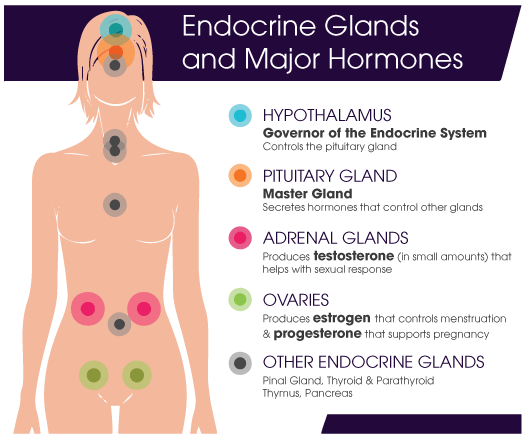
Our bodies produce over 50 different hormones in order to keep us functioning. Hormones control and regulate vital bodily functions including sleep, hunger, and growth. There are several ways in which a person might be producing too much or too little of one or several vital hormones. Any combination of an imbalance can cause life-altering symptoms. Our staff are experts at diagnosing imbalances and finding the right way to get you back on track and feeling your best.
Hormones are chemical messengers that work to regulate the development of the body as well as its growth and proper functioning. They are vitally important to almost every bodily function both physical and emotional. When hormones are in balance, the body and emotions work as they should. When they are out of balance, there are enormous impacts on a woman’s body, emotions, and daily life. Knowing what hormones are at work in the body, their function, and how they fluctuate throughout the month and throughout a lifetime is good information to learn. This will help you identify signs of imbalances as well as give you peace of mind if you experiencing “normal” hormone fluctuations.
Estrogen is probably the most well-known female hormone and is responsible for the development and maintenance of female characteristics of the body. Just like all other hormones, estrogen fluctuates throughout a woman’s life. Estrogen is essential for conception as it matures the uterine lining and preparing it to nourish an embryo. Estrogen will cause the body to change from the time of conception until after birth.
When perimenopause arrives, the levels of circulating estrogen begin to change. Quantity and quality of follicles begin diminishing, which causes fewer ovulations and lower progesterone levels to account for estrogen changes. This becomes even more pronounced during menopause. After menopause, women do not ovulate or menstruate and blood estrogen levels drop dramatically. This is usually the time when estrogen imbalance causes the most problems in a woman’s emotions and body.
Known informally as the “chemical messenger” in the body, progesterone is produced in the ovaries as well as the adrenal glands and is also in the placenta during pregnancy. It’s transported throughout the body via the bloodstream and affects everything from appetite to mood and overall body function. During premenopause, progesterone is usually around 8-10 ng/ml and increases during pregnancy and ovulation.
When perimenopause arrives, progesterone levels start to become more erratic. In some women, they are high and in others they are low. The same happens during menopause, with different symptoms resulting from either high or low levels. After menopause, progesterone tends to stabilize at 1 ng/ml.
Testosterone, which is normally thought of as a male hormone, plays an important part in women’s health. The hormone travels through a woman’s body and attaches to cell receptors to aid in regulation of bodily systems and promote sexual maturation. A healthy woman will have the highest amounts of testosterone up until their mid-30s, though these will fluctuate on a regular basis.

Symptoms caused by hormone deficiencies can range from an annoyance to drastically life-altering. The longer a hormone deficiency goes untreated, the more severe symptoms can become.
We will discuss your health history, symptoms, do a physical examination, and perform a blood test.
This appointment takes place 1 week after your initial consultation where we will review, in detail, the results of your blood work and how they might relate to any symptoms you may be experiencing.
Based on the combination of your physical exam, bloodwork, and review of symptoms, our providers will identify and diagnose any deficiencies that may be present. Based on this information, they may suggest medication and a treatment plan to counterbalance any deficiencies and restore optimal hormone function.
If a treatment plan is recommended by one of our providers, a patient service manager will discuss any questions you may have, explain what your individual health insurance covers, what your out of pocket costs may be, and outline a comprehensive breakdown of what you can expect both financially and your treatment plan.
